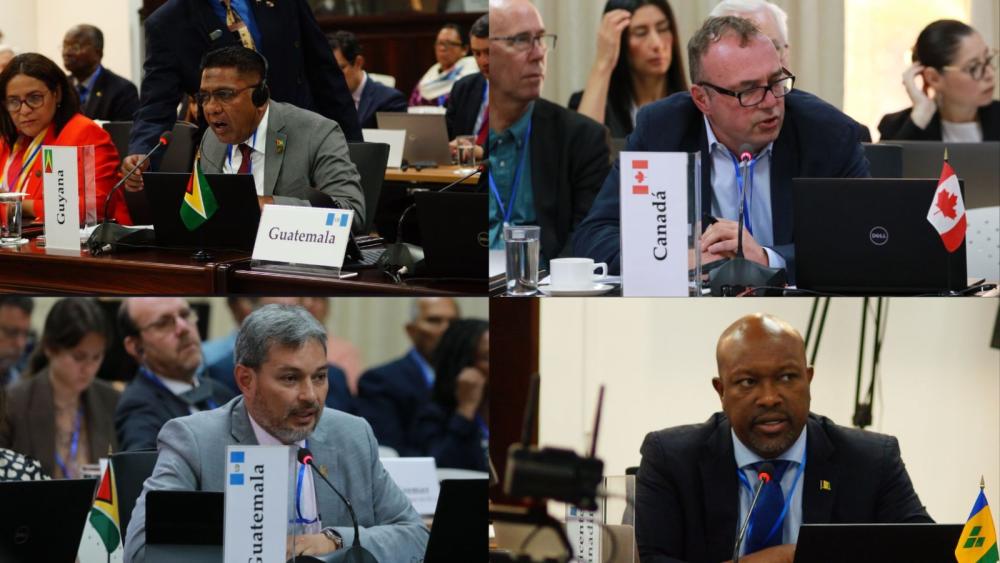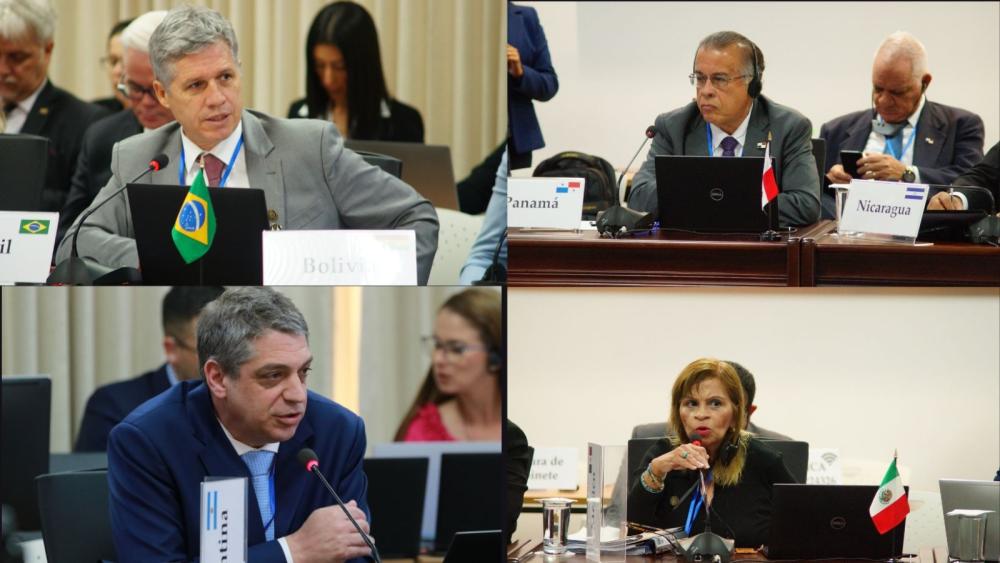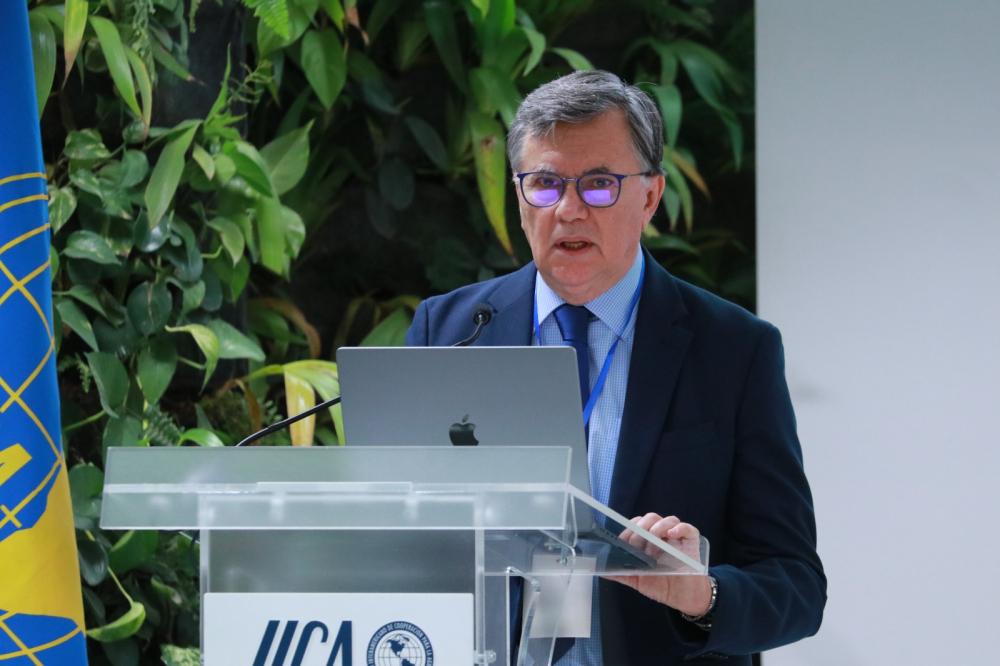Meeting in Costa Rica, the ministers of Agriculture of the Americas reflect on IICA’s role in placing small farmers front and center in the global debate on the future of agriculture

San Jose, 5 October 2023 (IICA) – The Ministers of Agriculture of the Americas insisted that without the agriculture sector there can be no global food security and commended the Inter-American Institute for Cooperation on Agriculture (IICA) for placing small farmers and their role in driving sustainability and protecting the world’s natural resources at the center of global discussions.
Discussions on the first working day of the Conference of Ministers of Agriculture of the Americas 2023 focused on the transformations taking place in agriculture and its role as an engine of economic development and social inclusion in the countries of the hemisphere.
The meeting, which takes place every two years, will end on Thursday, 5 October, bringing together ministers and senior authorities of Agriculture from the 34 countries, private sector representatives and farmers from various countries in the hemisphere, under the slogan “A Hemispheric Partnership for Food Security and Sustainable Development”.
The debate on climate action in family farming also featured prominently, with all the senior officials at the meeting highlighting the role of the sector and the funding needed to intensify sustainable practices.
In this respect, the Minister of Agricultural Development and Family Farming of Brazil, Paulo Teixeira, argued that countries that are the greatest carbon dioxide emitters must bear greater responsibility and assume a more active part in climate change mitigation efforts.
On the other hand, Zulfikar Mustapha, Minister of Agriculture of Guyana, reported that the Caribbean countries are working assiduously to reduce their food import dependence and thanked IICA for its work. He also pointed out that small farmers have been affected by the climate crisis, expressing the view that, “Countries that emit more greenhouse gases must pay for this”.
“Canada applauds IICA for the solutions on which it is working to mitigate the consequences of climate change and values its commitment to place family farmers front and center in any efforts to formulate agricultural policies”, said Tom Rosser, Assistant Deputy Minister of Agriculture and Agri-food Canada.
María de Lourdes Cruz Trinidad, International Affairs Coordinator at Mexico’s Secretariat of Agriculture and Rural Development, remarked that, “We consider agriculture to be an indispensable link in tackling current challenges and maintain the need to strengthen the hemispheric partnership to benefit our farmers, and particularly our small farmers, and as IICA Director General Manuel Otero would say, without leaving anyone behind”.

Augusto Valderrama, Minister of Agricultural Development of Panama, agreed that, “We are facing difficult times. If our countries fail to attack the problem of hunger and misery; and if we fail to attack the problems that are driving up food prices, more and more people in our societies will be affected and will have increasingly less access to food”.
Valderrama congratulated Otero and the entire IICA team for their work and described the Institute as a strategic partner of Panama.
Responsibilities for climate change
The Deputy Minister of Food and Nutrition Security of Guatemala, César Vinicio Arreaga, explained that family farming in his country is a priority and particularly, the situation of women and youth.
“Fifty percent of the population is involved in family farming, without counting self-employment. We must assist the sector in fostering greater soil and water conservation”.
Ariel Martínez, Undersecretary for Policy Coordination in Argentina’s Secretariat of Agriculture, Livestock and Fisheries, concurred with the views of Manuel Otero and IICA with respect to the challenges and opportunities facing the region.
“Today, there are asymmetries between countries that are becoming increasingly larger. And multilateralism, a system that provides an institutional structure to minimize these differences, allowing countries to talk to each other as equals, has completely digressed from its core function”, he reflected.
Minister of Agriculture of St. Vincent and the Grenadines, Saboto Caesar, stressed that IICA is an institution that bridges the gaps between the Caribbean and the rest of the Americas, which is something essential to the growth of the region. He added that, “Technical cooperation contributes to these efforts and has helped our country to connect people and create linkages in the supply chains”.

In his address, Manuel Otero focused on four underlying principles of IICA’s proposal to strengthen the hemispheric partnership for food security and sustainable development.
Firstly, agrifood food systems are not failed systems, although they should be strengthened. Their performance in recent decades has demonstrated their resilience in tackling the challenges of each era. Secondly, given its contribution to national economies and its endogenous capacity to mitigate climate change, agriculture must be considered as part of the solution. Thirdly, science and technology are the great transformational tools of our age and must be an essential component in devising a new generation of public policies.
Finally, he underscored the view that farmers will be key players in the transformations to be implemented and are the ones most able to contribute to the sustainable management of resources.
More information:
Institutional Communication Division.
comunicacion.institucional@iica.int